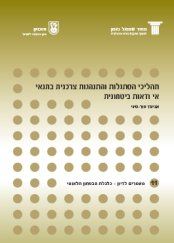Towards the end of the fall of 2000, terrorism began to strike the State of Israel again. It upset everyday life and prevented normal routine. However, according to Kirschenbaum (2005), if a society does not adopt a “survival strategy” it is likely to fall apart without its having the ability to rehabilitate itself in the future.
Basic to the study is the major working assumption that the more that time goes by and terrorism continues, so the public reconciles itself to the possibility of it being present on a long-term basis and deviates from its normal consumer behavior less and less intensively following the occurrence of each act of terrorism. Secondary assumptions examine the main components determining the economic behavior of the consumer public. The study makes use of Event Studies methodology by which it is possible to examine a large number of terrorist attacks over the long term “in isolation”, and compares three databases examining different types of consumer products (durable and non-durable).
The study found that there is a negative correlation between the passing of time and the intensity of the consumer response, indicating that with the passing of time the intensity of the deviation in normal consumer behavior becomes less and less. Furthermore, it was found that the process of the consumer public’s adaptation to terrorism over the long term, in relation to durable products is at a slower rate than to non-durable products; the more times passes and terrorism continues, the more local terrorist acts lose their impact in determining consumer behavior and likewise the intensity of the terrorism act itself. It is further shown that there are great differences as relativism consumer habits of the public when comparing different geographical regions, which is dependent on the occurrence of terrorist attacks over a long period of time. Finally, it is shown that the beginning of the period is characterized by a trend of lower average buying (in a comparable time frame) while the following periods were characterized by a rise in average buying after the occurrence of a terrorist attack.












